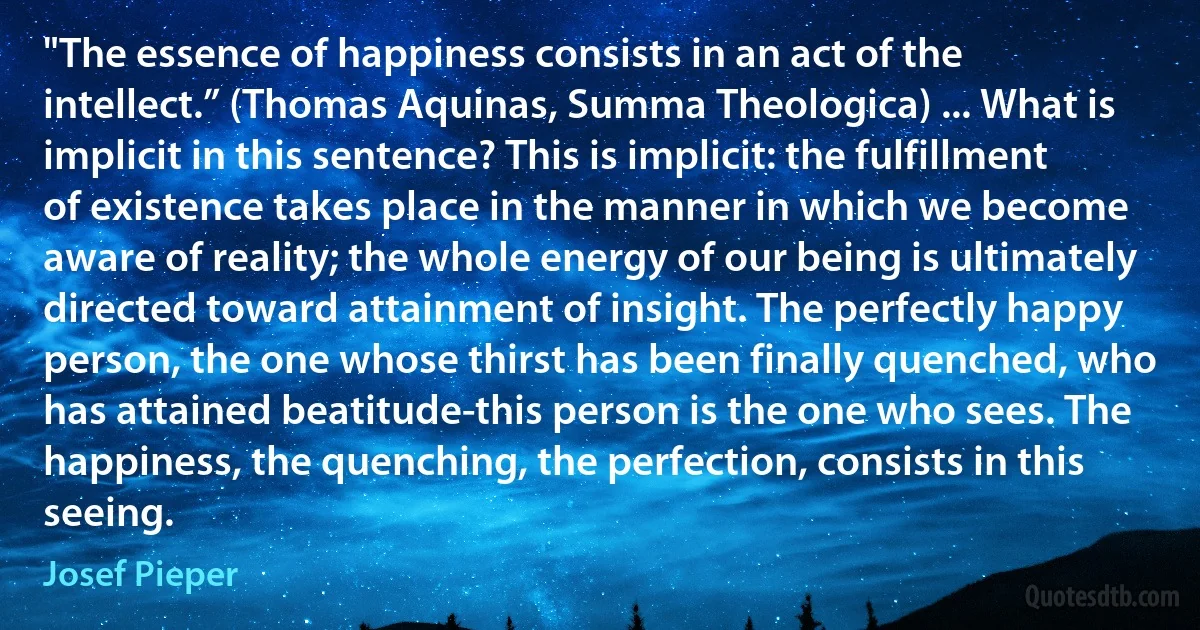Aquinas Quotes
And another reason to make sure we're not doing atrocious things at the slaughter plant is that if it is too easy to do something really atrocious to an animal; with the poor animal screaming and everything; the person who could do that might not have any problem torturing people. I remember one of the reasons that St. Thomas Aquinas said that we have to treat animals right is so that people themselves don't get corrupted.

Temple Grandin
It was even possible for the most venerated patriarchs of the Church, like St. Augustine and St. Thomas Aquinas, to conclude that heretics should be tortured (Augustine) or killed (Aquinas). Martin Luther and John Calvin advocated the wholesale murder of heretics, apostates, Jews, and witches. You are, of course, free to interpret the Bible differently-though isn't it amazing that you have succeeded in discerning the true teachings of Christianity, while the most influential thinkers in the history of your faith failed?

Sam Harris
For summer tourists to handle these intricate problems in a theological spirit would be altogether absurd; but for us these great theologians were also architects who undertook to build a Church Intellectual, corresponding bit by bit to the Church Administrative, both expressing - and expressed by - the Church Architectural. Alexander Hales, Albert the Great, Thomas Aquinas, Duns Scotus, and the rest, were artists.

Henry Adams
A Church which embraced, with equal sympathy, and within a hundred years, the Virgin, Saint Bernard, William of Champeaux and the School of Saint Victor, Peter the Venerable, Saint Francis of Assisi, Saint Dominic, Saint Thomas Aquinas, and Saint Bonaventure, was more liberal than any modern state can afford to be. Radical contradictions the State may perhaps tolerate, but never embrace or profess. Such elasticity long ago vanished from human thought.

Henry Adams
Like all great churches, that are not mere store-houses of theology, Chartres expressed, besides whatever else it meant, an emotion, the deepest man ever felt,- the struggle of his own littleness to grasp the infinite. You may, if you like, figure in it a mathematic formula of infinity,- the broken arch, our finite idea of space; the spire, pointing, with its converging lines, to Unity beyond space; the sleepless, restless thrust of the vaults, telling the unsatisfied, incomplete, overstrained effort of man to rival the energy, intelligence and purpose of God. Thomas Aquinas and the schoolmen tried to put it in words, but their church is another chapter. In act, all man's work ends there;- mathematics, physics, chemistry, dynamics, optics, every sort of machinery science may invent,- to this favor come at last, as religion and philosophy did before science was born.

Henry Adams
And as for the close connection between philosophy and poetry, we can refer to a little-known statement by Thomas Aquinas in his Commentary on Aristotle's Metaphysics [I, 3]: the Philosopher is akin to the Poet in this, that both are concerned with the mirandum, the "wondrous," the astonishing, or whatever calls for astonishment or wonder. This statement is not that easy to fathom, since Thomas, like Aristotle, was a very sober thinker, completely opposed to any Romantic confusion of properly distinct realms. But on the basis of their common orientation towards the "wonderful" (the mirandum - something not to be found in the world of work!) - on this basis, then, of this common transcending-power, the philosophical act is related to the "wonderful," is in fact more closely related to it than to the exact, special sciences; to this point we shall return.

Josef Pieper
How does one determine whether a law is just or unjust? A just law is a man-made code that squares with the moral law or the law of God. An unjust law is a code that is out of harmony with the moral law. To put it in terms of St. Thomas Aquinas: An unjust law is a human law that is not rooted in eternal law and natural law. Any law that uplifts the human personality is just. Any law that degrades human personality is unjust. All segregation statutes are unjust because segregation distorts the soul and damages the personality. It gives the segregator a false sense of superiority and the segregated a false sense of inferiority.

Martin Luther King Jr.
Are we innately aggressive?” asked Aquinas. "Was the nuclear predicament symptomatic of a more profound depravity? Nobody knows. But if this is so-and I suspect that it is-then the responsibility for what we are pleased to call our inhumanity still rests squarely in our blood-soaked hands. The killer-ape hypothesis does not specify a fate-it lays out an agenda. Beware, the fable warns. Caution. Trouble ahead. Genocidal weapons in the hands of creatures who are bored by peace.”
"I think I'm going to throw up,” said Brat.
"But the fable went unheeded. And the weapons, unchecked. And then, one cold Christmas season, death came to an admirable species-a species that wrote symphonies and sired Leonardo da Vinci and would have gone to the stars. It did not have to be this way. Three virtues only were needed-creative diplomacy, technical ingenuity, and moral outrage. But the greatest of these is moral outrage.

James K. Morrow
In truth, I sat down in 1992 to make a kids' show that I would want to watch with my kids. That would work for me. That would have sincerity in it, but not too much. That would mix what I loved about Monty Python and David Letterman with what I hungered for from Thomas Aquinas and Mother Theresa.

Phil Vischer
The Theatre of the Absurd has renounced arguing about the absurdity of the human condition; it merely presents it in being - that is, in terms of concrete stage images. This is the difference between the approach of the philosopher and that of the poet; the difference, to take an example from another sphere, between the idea of God in the works of Thomas Aquinas or Spinoza and the intuition of God in those of St. John of the Cross or Meister Eckhart - the difference between theory and experience.

Martin Esslin
One of the first major steps in the direction of modern skepticism came through the victory of Occam over Aquinas in a controversy about language. The statement that modi essendi were replaced by modi significandi et intelligendi, or that ontological referents were abandoned in favor of pragmatic significations, describes broadly the change in philosophy which continues to our time. From Occam to Bacon, from Bacon to Hobbes, and from Hobbes to contemporary semanticists, the progression is clear: ideas become psychological figments, words become useful signs.

Richard Weaver
I am a humanist because I think humanity can, with constant moral guidance, create reasonably decent societies. I think that young people who want to understand the world can profit from the works of Plato and Socrates, the behaviour of the three Thomases, Aquinas, More and Jefferson - the austere analyses of Immanuel Kant and the political leadership of Abraham Lincoln and Franklin Roosevelt.

James A. Michener
The effort is as evident and quite as laborious in modern science, starting as it does from multiplicity, as in Thomas Aquinas who started from unity, and it is necessarily less successful, for its true aims as far as it is Science and not disguised Religion, were equally attained by reaching infinite complexity; but the assertion or assumption of ultimate unity has characterised the Law of Energy as emphatically as it has characterised the definition of God in Theology. If it is a reproach to Saint Thomas, it is equally a reproach to Clerk-Maxwell. In truth it is what most men admire in both - the power of broad and lofty generalisation.

Henry Adams
There are ambiguities in the art of painting but they are the ambiguities of a fine precision: the discovered fact of the image containing at the same time the reverberations of the unknown, the truly mysterious... I would take this further and add that painting is itself precise in its ideas. In the sense that the image is the idea in its purist form.* [*"The image is a principal of our knowledge. It is that from which our intellectual activity begins, not as a passing stimulus but as an enduring foundation” - St. Thomas Aquinas, Opus XVI].

Patrick Swift
In his short life of thirty-two years Shankara achieved that union of sage and saint, of wisdom and kindliness, which characterizes the loftiest type of man produced in India... There is much metaphysical wind in these discourses, and arid deserts of textual exposition; but they may be forgiven in a man who at the age of thirty could be at once the Aquinas and the Kant of India... Shankara establishes the source of his philosophy at a remote and subtle point never quite clearly visioned again until, a thousand years later, Immanuel Kant wrote his Critique of Pure Reason... We do not know how much Parmenides' insistence that the Many are unreal, and that only the One exists, owed to the Upanishads, or contributed to Shankara; nor can we establish any connection, of cause or suggestion, between Shankara and the astonishingly similar philosophy of Immanuel Kant.

Adi Shankara



